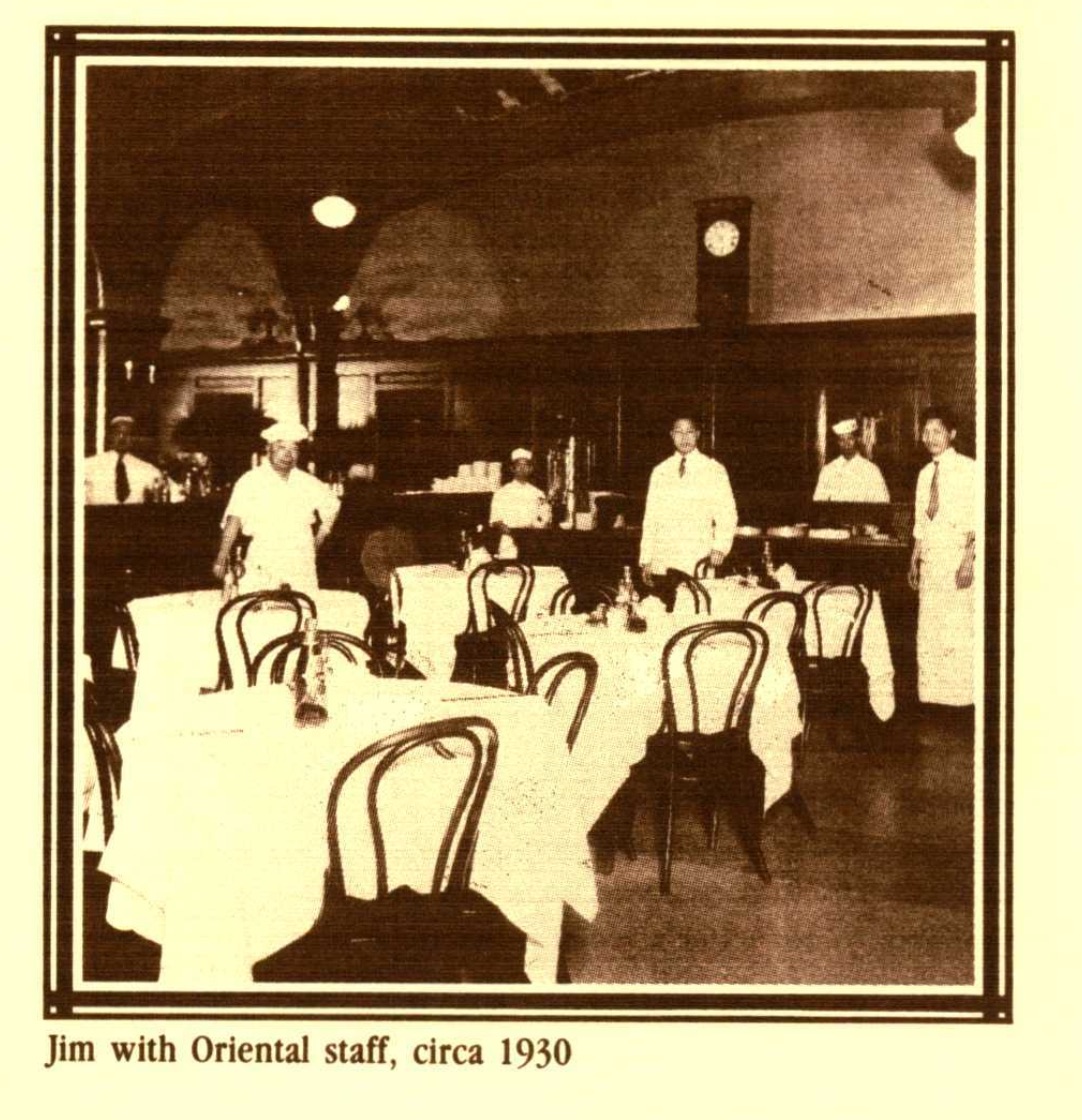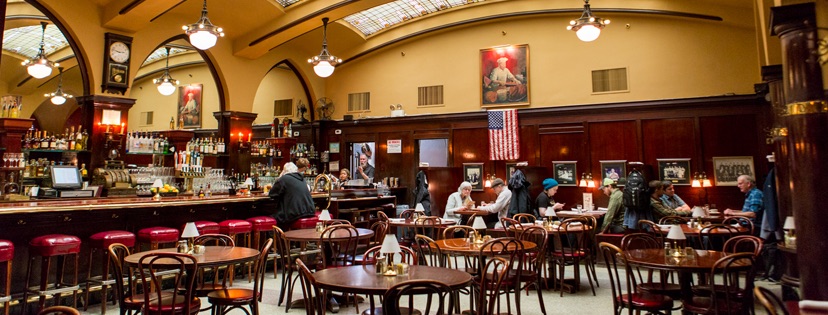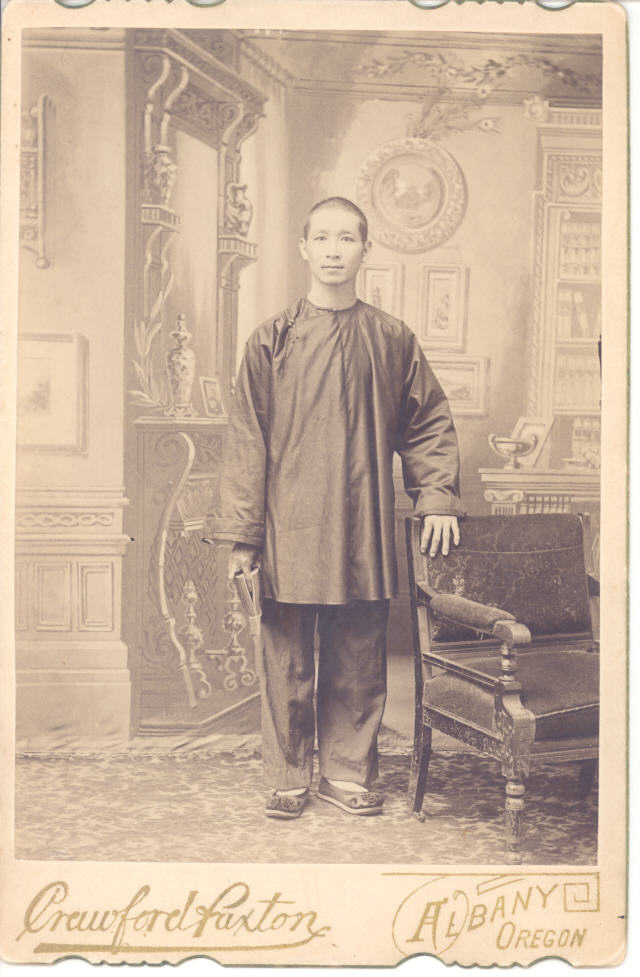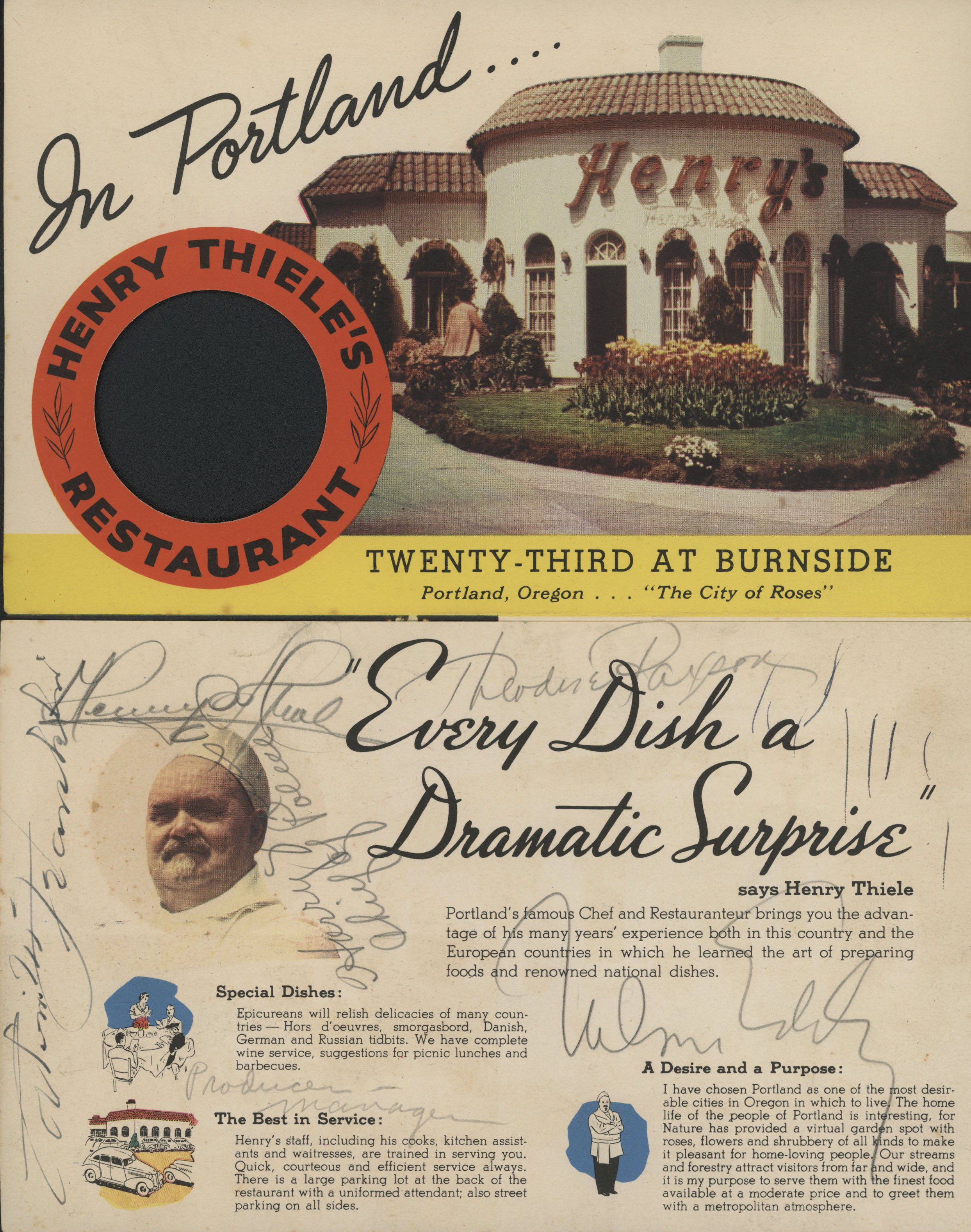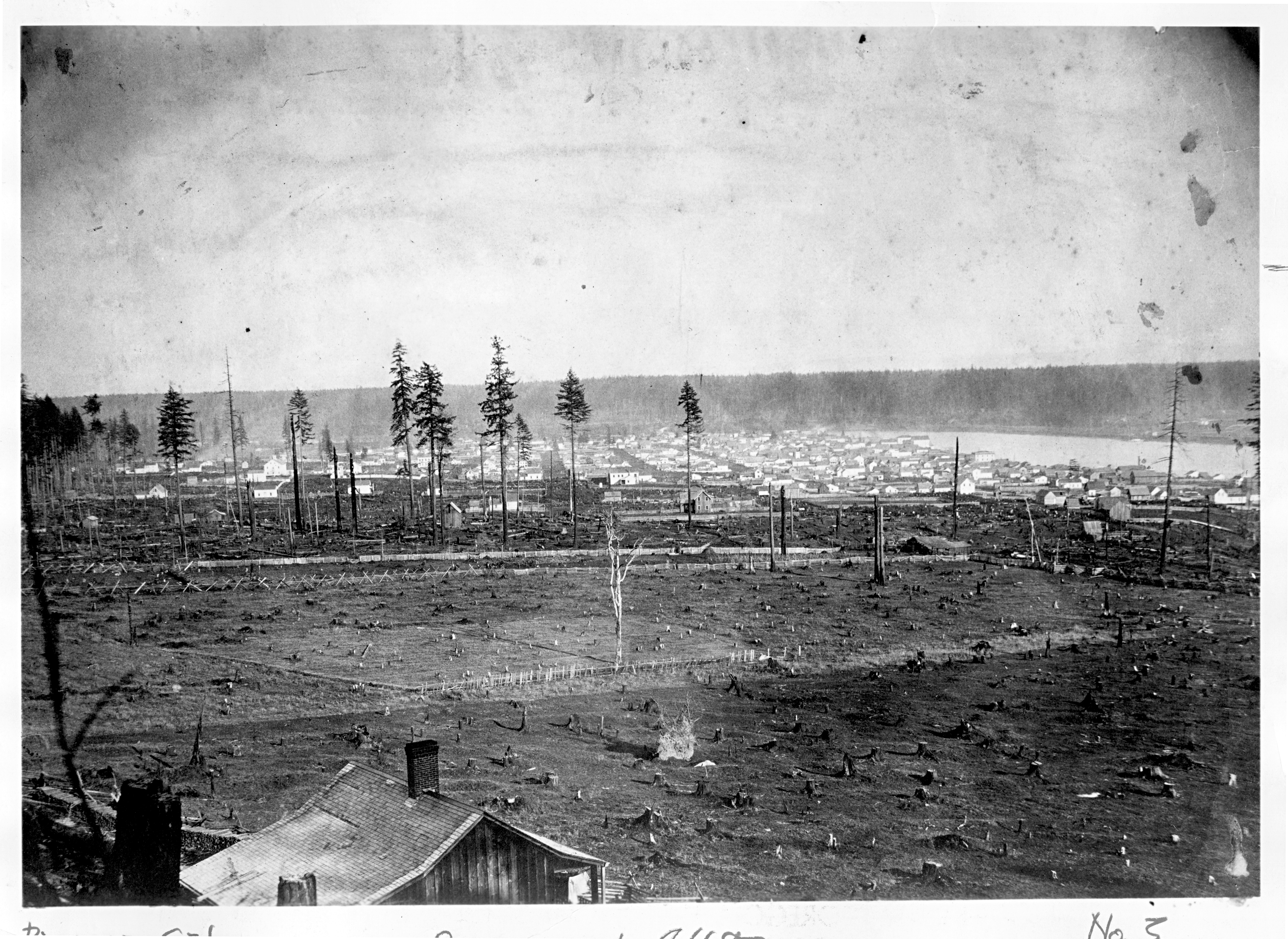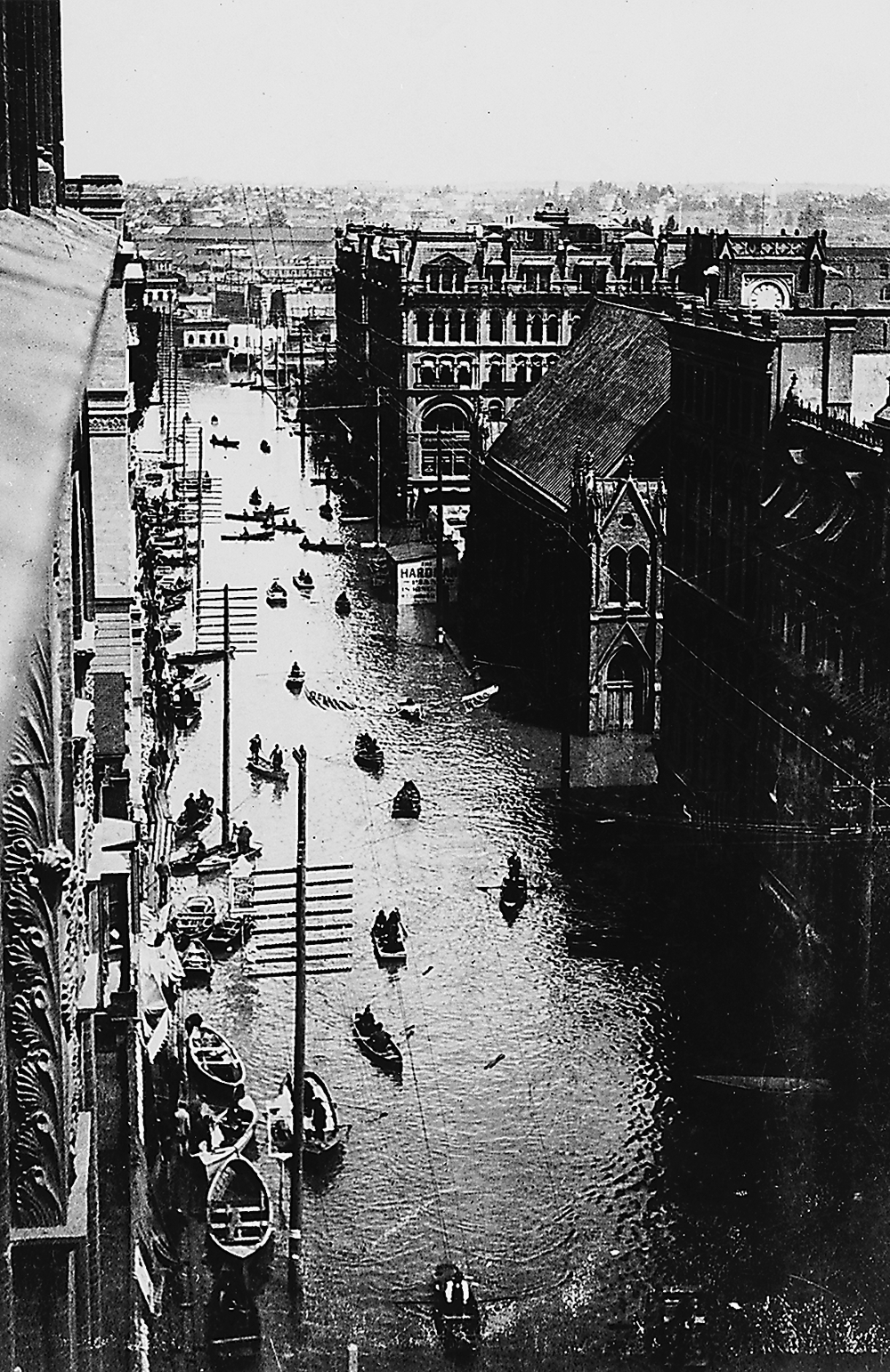Huber’s Café may be the oldest restaurant in Portland. Famous for its roast turkey, flaming Spanish coffees, and period décor, the restaurant is also known for the continuity of its ownership. Its history is inextricably connected to the Louie family, which has owned and managed the restaurant for over a century. The restaurant had its beginnings in 1879, when W. L. Lightner opened the Bureau Saloon at First Avenue and Morrison Street in downtown Portland. Five years later, Lightner hired Frank Huber—who Collier’s Magazine described in 1939 as a “genteel, scholarly mixer of drinks”—to work behind the bar. By 1887, Huber was a partner and within a year the sole proprietor.
Louie Wei Fung, known as Jim Louie, had immigrated to Portland in 1881 from Guangdong, China, at age eleven. He had a convivial nature, worked hard, and developed considerable culinary skills. Huber hired him in 1891 to work his “free lunch” counter— a staple of saloons during this period that gave steady drinkers free meals in exchange for their business.
The partnership proved profitable, as Huber plied drinks with staid ceremony while Louie served what became his signature roast turkey. They kept the restaurant open during the 1894 flood, when, the Oregonian later reported, Louie “sat in a rowboat [at] the back of the lunch counter…and dished out steamed clams and turkey sandwiches to patrons in boats.”
The Bureau Saloon was renamed Huber’s in 1895. It was, according to Collier’s Magazine, “more than a bar, being the downtown club of the day, where everybody met everybody twice daily.” In 1910, Huber’s moved to its present location in the Oregon Pioneer Building, at 411 Southwest Third Avenue. The stained glass skylight, mahogany paneling, terrazzo floor, and fixtures date from this period. Huber’s was added to the National Register of Historic Places in 1979.
Frank Huber died in Seaside on April 29, 1911, passing the ownership of the restaurant to his wife Augusta Huber. She hired Louie as manager, and he moved to Frank Huber’s position behind the bar while retaining authority over the roast turkey. Every fall, Louie personally inspected, bought, and froze over a thousand turkeys, and he attributed his mastery in cooking the bird to diligent practice. “A young fellow, he cook a hundred turkey, and know nothing,” Louie told Collier’s Magazine. “He cook a thousand turkey and know not very much. Cook ten thousand turkey, he know a little bit. Cook fifty thousand turkey, he know something about it.”
Huber’s survived Prohibition by converting to a full-time restaurant and supplementing profits through the sale of incognito drinks, including the now-legendary Manhattan cocktails disguised in coffee cups. In 1939, the restaurant gained a national reputation when writer Frank Taylor published a profile of Louie entitled “Turkey All the Time” in Collier’s Magazine. Despite the sympathetic portrayal of both Louie and the restaurant, however, racial stereotyping and the vernacular language used in the article demonstrate how prejudice was an obstacle for Chinese Americans.
After Augusta Huber died in 1940, Louie partnered with her son John, who sold half of the restaurant to him for a dollar, an act remembered by Louie family members as “generous and kind.” Louie died at the age of seventy-six on September 5, 1946, while helping clean the bar. His obituary was front page news in the Oregonian, which also noted the ways that racist policies like the Chinese Exclusion Act of 1882 had circumscribed his life. Louie was never able to bring his son, two daughters, or wife to America and was only able to make three visits “to his homeland in 54 years.”
Jim Louie left ownership of Huber’s to his nephew Andrew Louie, who had worked there since he was in high school. By 1952, Andrew bought out John Huber, and the restaurant has remained entirely in the Louie family ever since. Andrew Louie was manager for many years, aided by his children Dave, Lucille, and James Kai, who had started working at Huber’s when he was fourteen years old. After Andrew died, he willed his ownership to his three children, and James became manager, a position he filled for decades until he died in 2025.
James is responsible for the most recent element of Huber’s signature service: the Spanish Coffee tableside experience. After being served the drink at the Fernwood Inn in Milwaukie, James adopted it and further developed Huber's tableside routine. adding nutmeg, triple sec, a match lit with one hand, and considerable brio. Huber’s is the largest buyer of Kahlua in Oregon and is claimed to be the largest independent buyer in the United States.
The Oregon Restaurant and Lodging Association honored James Kai Louie in 1998 as Restaurateur of the Year. As of 2021, his son James worked at Huber’s, extending the Louies’ association with the restaurant into the fourth generation. In an ever-changing neighborhood, Huber’s long legacy of hospitality endures.
-
![]()
Huber's brochure.
Courtesy Huber’s Café
-
![]()
Jim Louie, chef manager and later part owner of Huber's restaurant, May 6, 1935.
Oregon Historical Society Research Library LOAN collection 021746
-
![]()
Huber's brochure.
Courtesy Huber’s Café
-
![]()
Huber's brochure.
Courtesy Huber’s Café
-
![]()
"Turkey of All the Time" article by Frank J. Taylor in Collier's Magazine, December 23, 1939.
Courtesy Collier's
-
![]()
Jim Louie featured in Collier's magazine, December 23, 1939.
Courtesy Collier's
-
![]()
Jim Louie, co-owner of Huber's, December 15, 1940.
Oregon Historical Society Research Library Journal collection 012705
-
![]()
Harry Fong at Huber's Restaurant, November 24, 1953.
Oregon Historical Society Research Library Digital Collections Org Lot 1284; Box 46; 2206-2
-
![]()
Andrew Louie with a Huber’s Café turkey in 1962.
Courtesy Oregonian Archives
-
![]()
Andrew Louie, nephew of Jim Louie, owner of Huber's restaurant, July 1, 1975.
Oregon Historical Society Research Library LOAN collection 021748
-
![]()
Huber's interior.
Courtesy Huber’s Café Facebook page
Related Entries
-
![Chinese Americans in Oregon]()
Chinese Americans in Oregon
The Pioneer Period, 1850-1860 The Cantonese-Chinese were the first Chi…
-
![Dan and Louis Oyster Bar]()
Dan and Louis Oyster Bar
Dan and Louis Oyster Bar is a family-owned seafood restaurant that has …
-
![Henry Thiele (1882-1952)]()
Henry Thiele (1882-1952)
Henry Thiele was a Portland restaurateur, chef, and socialite whose epo…
-
![Portland]()
Portland
Portland, with a 2020 population of 652,503 within its city limits and …
-
![Rose Garbow Naftalin (1898–1998)]()
Rose Garbow Naftalin (1898–1998)
Rose Naftalin was a restauranteur and cookbook author in Portland and t…
-
Willamette River flood of 1894
The Willamette River, in its natural state, has been subject to annual …
Related Historical Records
Map This on the Oregon History WayFinder
The Oregon History Wayfinder is an interactive map that identifies significant places, people, and events in Oregon history.
Further Reading
March 9, 2021 Interview With James Kai Louie Conducted By Michael Schepps
Hubers Brochure (courtesy of Multnomah County Library)
“Forebears Call Chinese Chef.” The Oregonian, 7 September 1947, P.1
Sullivan, Ann “Huber’s Flourishes as Portland’s Oldest Restaurant.” The Oregonian, 4 October 1984, p. 120
Taylor, Frank “Turkey All The Time.” Collier’s Magazine, 23 December 1939, pp 20, 61

